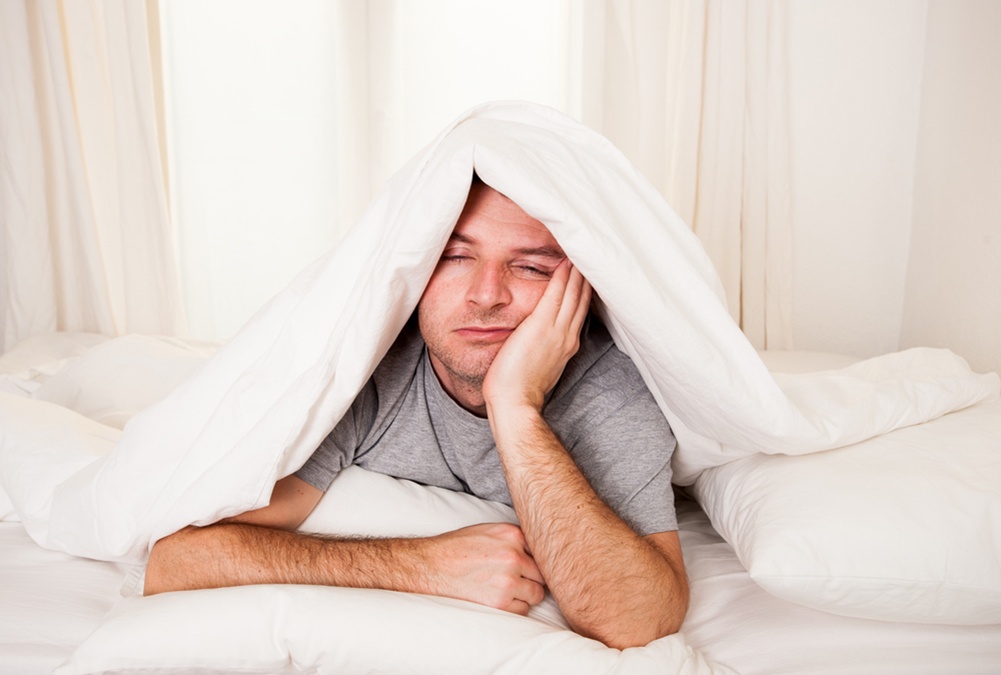 People with sleep apnea are often overweight or obese.
People with sleep apnea are often overweight or obese.
It is, in fact, often due to the fat buildup around our necks, backs, and chests that press on the airways, making them collapse during the night while you sleep.
Scientists from the James Madison University wondered whether being overweight and having sleep apnea fed into each other.
Not just through obesity causing sleep apnea in the above-mentioned way, but also through sleep apnea causing cases of being overweight by making people physically less active during the day.
In the study published in the journal Sleep and Breathing, they identified 35 people with sleep apnea and used another 24 people without this condition for a comparison.
They gave all the subjects an accelerometer to wear for between four and seven days, including at least one day on the weekend.
It turned out that the sleep apnea sufferers did not get up and move around fewer times per day than those from the non-apnea group, but this was not all. All their other recorded physical activity statistics were worse.
1. They took fewer steps.
2. They engaged in fewer minutes of moderate intensity activity.
3. They engaged in fewer minutes of moderate-to-vigorous activity.
In other words, they moved around too little and too slowly.
Their inability to engage in moderate and intense physical activity also suggested that they did not observe a proper exercise program, such as running, swimming, cycling, or going to the gym.
But this is precisely what they have to do to lose weight and improve their sleep apnea, or is it?
In 2011, scientists tested the effects of exercise on sleep apnea and published their results in the journal Sleep.
They recruited 43 sedentary and overweight or obese adults that had recorded cases of moderate to severe sleep apnea, dividing them into an exercise group and a stretch-only group.
The scientists tested their sleep apnea in a laboratory prior to the treatment and after 12 weeks, when the treatment ended.
The exercise group did not lose more weight than the stretching group, but their sleep apnea symptoms were seen to improve significantly.
As a result, their blood oxygen levels were higher, and they functioned better.
Therefore, it would seem that exercise can drastically improve sleep apnea and that people with this sleep breathing disorder are at a major disadvantage because they are incapable of exercising as easily as others.
Fortunately, we’ve developed an almost effortless way to stop snoring and sleep apnea exercises that open up and strengthen your breathing passages, keeping it open day and night.

 Overcoming IBD
Overcoming IBD Multiple Sclerosis
Multiple Sclerosis Banishing Bronchitis
Banishing Bronchitis Gum Disease Gone
Gum Disease Gone Overcoming Onychomycosis
Overcoming Onychomycosis Neuropathy No More
Neuropathy No More The Prostate Protocol
The Prostate Protocol Brain Booster
Brain Booster
 Ironbound
Ironbound
 Solution for Shingles
Solution for Shingles
 The Bone Density Solution
The Bone Density Solution
 The Ultimate Healing Protocol
The Ultimate Healing Protocol
 The Parkinson's Protocol
The Parkinson's Protocol
 The Chronic Kidney Disease Solution
The Chronic Kidney Disease Solution
 Overthrowing Anxiety
Overthrowing Anxiety The Fatty Liver Solution
The Fatty Liver Solution The Hypothyroidism Solution
The Hypothyroidism Solution
 The End of Gout
The End of Gout The Blood Pressure Program
The Blood Pressure Program
 The Oxigized Cholesterol Strategy
The Oxigized Cholesterol Strategy
 Stop Snoring And Sleep Apnea Program
Stop Snoring And Sleep Apnea Program
 The Arthritis Strategy
The Arthritis Strategy The Vertigo & Dizziness Program
The Vertigo & Dizziness Program The 3-Step Diabetes Strategy
The 3-Step Diabetes Strategy Hemorrhoids Healing Protocol
Hemorrhoids Healing Protocol The Erectile Dysfunction Master
The Erectile Dysfunction Master Weight Loss Breeze
Weight Loss Breeze The IBS Program
The IBS Program The Insomnia Program
The Insomnia Program The Migraine and Headache Program
The Migraine and Headache Program The Neck Pain Solution
The Neck Pain Solution The Menopause Solution
The Menopause Solution The Ejaculation Master
The Ejaculation Master The TMJ Solution
The TMJ Solution The Acid Reflux Solution
The Acid Reflux Solution The Fibromyalgia Solution
The Fibromyalgia Solution The Psoriasis Strategy
The Psoriasis Strategy